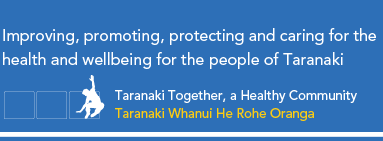Child harm at the centre of White Ribbon Day 2019
22 November 2019
Taranaki children are witnessing family violence at an alarming rate. From July 2018 – June 2019, Taranaki Police attended 4,598 family harm incidents; 74 percent of these incidents were locations were children were also present.
Taranaki District Health Board paediatrician Dr Nicola Nelson says, “Exposure to family violence can have significant impact on a child’s health throughout their life. It may lead to serious physical and mental health problems, learning difficulties, problems controlling anger and emotions, tendencies towards criminal activities, abusive relationships, addiction to drugs and alcohol, suicidal thoughts and long-term stress.”
That’s why this White Ribbon Day, Taranaki DHB has chosen to shine the spotlight on the direct impact adult’s actions can have on the health of our future generations.
“We know life is stressful for many families, but it is in these environments that infants and young children are particularly vulnerable. The vast majority of children enjoy loving and nurturing families but a significant minority are experiencing violence, abuse and neglect,” said Dr Nelson.
It's not ok for children and young people to experience violence, whether they are victims or witnesses. Research shows that violence in the home affects children whether they see it, hear it or just know about it.
Adults are role models for children, so this year we’re challenging people to think a bit differently about family violence and consider that what children see and hear impacts them socially, emotionally, cognitively and physically as they grow up.
“Children need adults to keep them safe and we all have a role to play in this. If you are worried about a child, don't ignore it, seek help and advice,” said Dr Nelson.
Taranaki DHB (the DHB) is committed to reducing and preventing health impacts of family violence through the Violence Intervention Programme (VIP) which aims to identify early, support, assess and refer victims presenting at the DHB’s health services to specialist community organisations.
Dr Nelson explains, “As health professionals we are privileged to have a window through which we can observe how families work together when things are going well and in times of stress. All of our health services are points of contact with people that are experiencing family violence.”
Health staff routinely offer support to all women, men and children by asking standard questions about safety in homes to reduce the long term harm of family violence.
From 25 November, White Ribbon Day messages will be loud and clear at Taranaki DHB with displays at the entrances to both Taranaki Base and Hawera hospitals. Each display aims to increase awareness of family violence as a health issue and help protect Taranaki’s vulnerable children.
Where to find help for family violence:
- If you or someone you know is in immediate danger, call 111 and ask for the police
- Women’s Refuge (0800 733 843); or visit the following websites:
- https://taranakiwomensrefuge.co.nz/
- http://nnsvs.org.nz/#home
- www.areyouok.org.nz
- https://www.2shine.org.nz/get-help/helpline
Last updated: Friday, November 22, 2019


